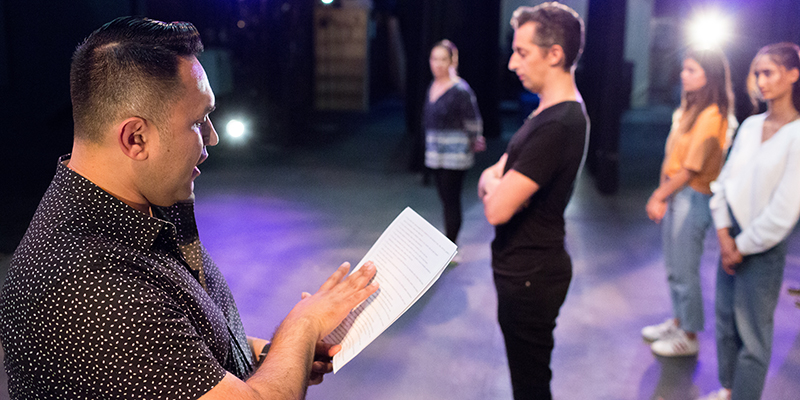
In the first semester, all graduate students will take the Graduate Diagnostic Exam. This exam, consisting of questions about theatre history, dramatic literature, design, directing and acting, serves to guide the student’s advisor and Director of Graduate Studies to aid the student in designing a course of study that both encompasses the breadth of competence as outlined in the individual program and addresses any deficiencies in the individual student’s background.
Program of Study: 60 units total
Sample Curriculum
- Full-time: Three-year program
- Part-time: Four to seven-year program
Required Core Courses
Students must take all seven courses (21 units) listed below.
-
An introduction to the methodologies, challenges and issues in teaching in general and in teaching theatre in particular.
-
Students learn how to carry out academic research on the graduate level in order to write about the history, theory and practice of performance. Students will carry out several small and one large research papers.
-
A continuation and development of the issues raised in THEA 6000. Students research and discuss issues in theatre pedagogy and practice, particularly at the university level.
-
A seminar class dedicating to exploring the issues specific to teaching acting, examining different types of acting classes (beginning for the non-major, scene study, voice and movement, etc.) and considering the issues and challenges in teaching acting in different settings. This course also features a practicum element in which the student attends and assists a faculty member in teaching acting at LMU.
-
An academic seminar on the theories of acting and directing, including but not limited to Harrison and Nommo, Gates and the Signifyin’ Monkey as our base, then Aristotle, Diderot, Brecht, Stanislavski, Chekhov, Grotowski, Craig, Suzuki, Strasberg, Spolin, Adler, Meisner, Antoine, Meyerhold, Kazan, Brook, Clurman, Tagore, Black Acting Methods, and many others. The course takes an international, diverse, and historical overview to the crafts of acting and directing.
-
A practical course about the process of directing a play. Students learn various techniques and processes and the course culminates in the direction of scenes and one acts for public presentation.
-
An exploration of how to ensure an equitable and diverse classroom, and engage issues of equity, diversity, and social justice.
Thesis
(6 units):
- THEA 6900 Thesis (Fall)
- THEA 6910 Thesis (Spring)
The thesis for the MFA in Performance Pedagogy will traditionally be a combination of creative project and written research. The student will research and prepare a play for production in the Fall and then direct the production in the Spring, submitting a production book as part of the requirements. Other possible theses may be undertaken under the direction of the student’s advisor.
Electives
Students must take a minimum 11 of the courses (33 units) listed below.
Selected in conjunction with advisor after taking Graduate Diagnostic Exam. Possible courses include but are not limited to:
- THEA 6310 Practicum: Teaching Beginning Acting
- THEA 6320 Teaching the Specialized Acting Course
- THEA 6350 Techniques in Actor Coaching
- THEA 6355 Advanced Techniques in Actor Coaching
- THEA 6360 Techniques for Teaching Acting for Film, Television and New Media
- THEA 6410 The Creative Process
- THEA 6420 Playwrights Center Stage
- THEA 6440 Writing and the Ensemble-Derived Performance
- THEA 6450 Theatre for Social Justice
- THEA 6455 Voices of Justice (May be repeated for credit up to nine units)
- THEA 6460 Children’s Theatre
- THEA 6510 Performance Practicum (may be repeated for credit for up to six units)
- THEA 6600 Survey of Dramatic Literature
- THEA 6750 Advanced Directing
- THEA 6775 Directing Practicum (may be repeated for credit for up to six units)
- THEA 6800 The Collaborative Process
- THEA 6810 Advanced Design
- THEA 6980 Advanced Topics in Theatre Pedagogy (May be repeated for credit when a different topic is offered)
- THEA 6990 Independent Study